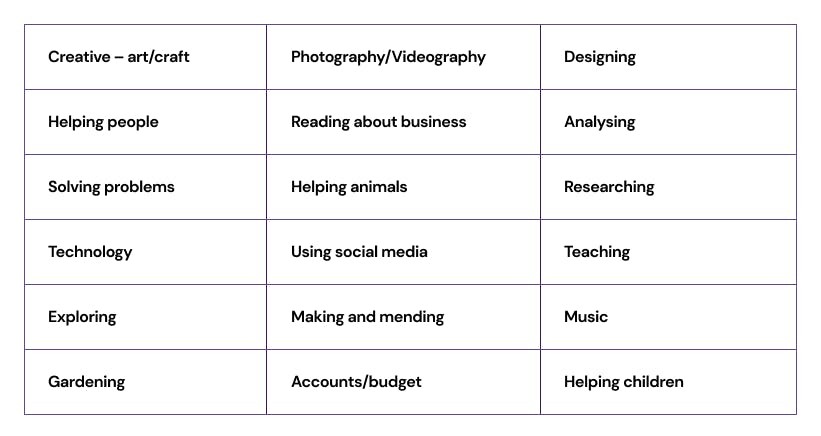
Develop your interests
Do you go to work to do a job you are passionate about, that gives you a sense of achievement, where the time just runs away, and even when you are not working you are interested to find out more?
Or do you do a job that pays you a salary but gives you nothing more?
If it is the first, then well done! If it is the second, then you are never too late to find a career that you find satisfying. To do this, you need to spend some time getting to know yourself, and find what drives your energy, enthusiasm and genuinely interests you.
We have created a short exercise to help you to start this process. So, where to start:
1. Reflect on what you enjoy doing
Getting to know your career interests means finding out what you enjoy doing on a regular basis.
- What do you like doing after work or on weekends? Could this become a career?
- What do you dream about?
- In your previous jobs, what did you like and dislike?
- At school/college/hobbies or at work, what have been the most fulfilling for you and why?
- If you had to teach one subject, what would it be?
To help you start to generate some ideas we have created a list to get you started:

Now ask yourself:
- Do you prefer to be/work indoors or outside?
- Are you creative, enterprising, investigative or social?
- Do you enjoy routine and a structured place of work?
- Or do you thrive on variety?
2. Talk to your Career Coach or friends/family
Talking to friends and family or your Career Coach can potentially help you to identify and define your areas of interest. Doing this can also help you to develop your ideas further, plus they can be a good support to you.
A Career Coach can especially be helpful for you as they are impartial and can help you to identify relevant courses, and talk through job descriptions in these areas to help you recognise if this is an area you would like to explore further.
3. Test your interests out
Try some online courses in the areas that interest you. There are more than 1,000 free online courses in Stay Nimble’s Learning Hub for you to access 24/7. And if you can’t find what you are looking for, there are lots of additional free online resources that you can access, such as via YouTube, plus many low cost courses through Udemy, Reed and Learn Direct to help you identify your preferences.
4. Find yourself a mentor
A mentor can help you to develop, and build your awareness and contacts, supporting your step onto the right path. Try to identify a suitable mentor through your networks, be that from work shadowing, volunteering, temping or contacting industry associations.
A mentor can be such a precious tool to help you find contracts, recommend the right courses that are recognised by the industry or generally give you advice on being the best you can be.
5. Final steps
Finally, by finding the work that feels right for you, you are more likely to stay in the position longer, be happier and potentially want to develop and grow within the role which is both to your and your potential employer’s benefit. Therefore a win/win situation for you and your boss. But achieving that happiness through your work is the biggest win for you!
Subscribe to Spark! our fortnightly newsletter for teams & managers
Subscribe to our fortnightly newsletter
Spark! is where we share the latest career development and team performance insights, inspiring articles and podcasts along with free resources for teams and managers.